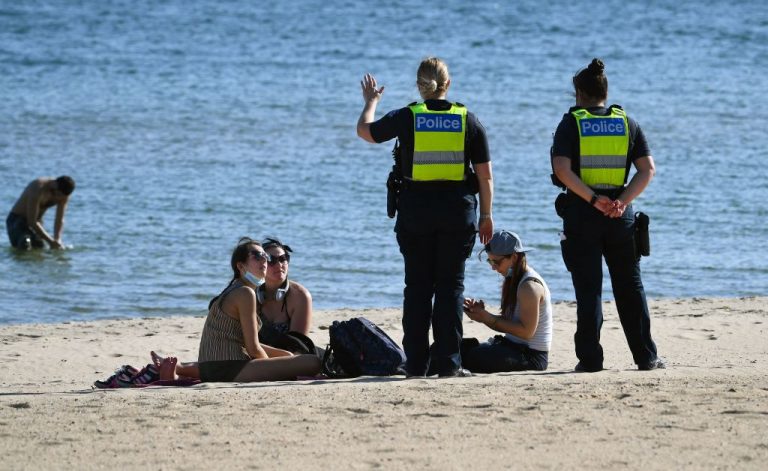Published: September 7, 2021

A resurfaced Australian television segment promoting an initiative recommended by a federal parliamentary commission that would require social media users register with their government identification in order to “remove the veil of being anonymous” stoked fears that lockdown-dependent federal and state governments are planning to install a system analogous to the Chinese Communist Party’s (CCP) social credit score.
In a segment of Australia’s 9 News published by The Post Millennial on Sept. 6, a female announcer introduces the proposal with extreme rhetoric, describing it as a “radical plan to crack down on social media abuse.”
A field reporter then describes the system in lucid detail, “Essentially, it would work the same as a passport. Australians forced to submit 100 points of identification, like their drivers licence or passport, when using social media accounts like Facebook or Twitter.”
The reporter admits that “police would have access to those social media accounts,” justifying the elimination of privacy as “part of a crackdown on online abuse.”
He also described it as, “All part of plan hoping to deter people from engaging in bad behaviour.”
The anchor also quoted the inquiry’s Chairman as saying, “There is merit to remove the veil of being anonymous.”
The story, however, appears to be from April based on a Tweet promoting the segment from the outlet’s Twitter account, but picked up media traction this month after an anonymous user retweeted it with the caption, “The Australian federal government is planning to de-anonymize the internet to introduce a social credit system to combat ‘online abuse’ – police will have access to individuals’ social media accounts, which will be linked to people’s passports,” and garnered more than 10,000 shares.
A sore spot
The topic may have hit a public nerve as a result of recent actions taken by various levels of the Australian government. On Aug. 25, the federal government based a bill through both levels of parliament that gave the Australian Federal Police and the Australian Criminal Intelligence Commission broad, sweeping powers to disrupt service, surveil large groups of citizens, and even take over social media and chatroom accounts for those suspected of committing, being involved in, or having communicated with anyone participating in what the government deems as an “offense.”
The bill notably shields individuals and companies who comply with the directives from civil liability while simultaneously punishing the uncooperative with a maximum of 10 years imprisonment.
The state of South Australia released a new phone app titled Quarantine SA that relies on facial recognition and geolocation to enforce the state’s mandatory 14-day quarantine in a government-run hotel for any citizen that has registered a positive PCR test or been flagged by contact tracers as having been near a positive PCR test.
Users of the app will be able to quarantine at home rather than in a facility, but are required to be fully vaccinated. The app subjects users to multiple, randomized check-ins per day where they must use their face for clearance within 15 minutes. Users who miss a check for any reason will be called and made to explain themselves, while those who miss the call will be subject to a visit by law enforcement.
At least 500 people traced through contact tracing in South Australia were under mandatory quarantine after a group of five truck drivers registered a positive PCR test.
In August, citizens of Melbourne hit the streets to protest after being trapped in more than 200 days of total lockdown. They were met by pepper spray, rubber bullets, and tear gas from local law enforcement.
Not only did citizens meet with force, but demonization and vilification from the government after Victoria State Premier Dan Andrews classified the demonstrations as “not only disgusting, but…absolutely unlawful.” Andrews vowed that “The full force of the law will be brought upon those people.”
On Sept. 5, a Tweet revealed Andrews stating his administration would soon take the step to lock the unvaccinated out from the economy.
“There is going to be a vaccinated economy, and you get to participate in that if you are vaccinated…We’re going to move to a situation where, to protect the health system, we are going to lock out people who are not vaccinated and can be.”
“If you’re making the choice not to get vaccinated, then you’re making the wrong choice,” said Andrews, adding, “It’s not going to be safe for people who are not vaccinated to be roaming around the place spreading the virus.”
Updates
The trend is not limited to Australia. In July, the United Kingdom announced plans to roll out a “government-backed rewards programme” that would track spending and physical activity through a phone app and data collection devices such as a Fitbit.
An article by The Guardian described the program in the following way, “Lifestyle habits such as taking part in a regular run or walking to school daily could be linked to free treats in pilot scheme…The scheme will monitor family supermarket spending, rewarding those who reduce their calorie intake and buy more fruit and vegetables.”
“People increasing their exercise by taking part in organised events or walking to school will also accumulate extra ‘points’ in a new app.”
In Israel, the government announced at the end of August that fully vaccinated status in the Green Pass vaccine passport system would expire six months after the most recent injection, requiring Israeli citizens to accept a third, and possibly fourth dose of the gene-therapy based vaccines in order to continue to participate in everyday society.
In Italy, at the beginning of September, Prime Minister Mario Draghi set the stage not only for mandatory injections for all citizens once the European Union’s health regulators gave the vaccines full approval, but that even supermarkets would begin to require vaccine passports as a condition of employment.
Source – https://www.visiontimes.com/2021/09/07/australia-social-credit-facebook-id.html
